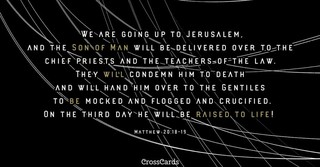- Recent Translations
- All Translations
Matthew 20:8
Share
Settings
Matthew 20:8 in Other Translations
Matthew 20:8 Meaning and Commentary
So when even was come
At six o'clock, or when the sun was set, which was the time of paying labourers their wages: thus in the parable of the Jews, before referred to, which bears some resemblance to this, it is said,
``(bre tel) , F19 that "at evening time" the labourers came to take their wages.''Sooner than this, one that was hired for a day, could not demand it; nor was the master of the vineyard, who hired him, obliged to pay him till the sun was set F20, which was the time of his going forth from his labour F21. This even may be understood, either of the evening of the Jewish state, upon the calling of the Gentiles; or of the end of the world, the close of the Gospel dispensation; when the work of it will be over, when all the elect of God, Jews and Gentiles, shall be called and gathered in, and all brought to repentance towards God, and faith in Christ.
The lord of the vineyard saith unto his steward:
by the lord of the vineyard may be meant God the Father, who has chosen and separated the vineyard of the church for himself; and has made it the care and charge of his Son Jesus Christ; who, as mediator, may be designed by "his steward"; who has not only all the stores of grace in his hand, to distribute to his people, in this life, as their cases require; but has also eternal life and happiness in his possession for them; not only the promise of it, but that itself; and has a power of giving it to as many as the Father hath given him; and which he, the righteous judge, and faithful steward, will give at the day of judgment, to all that love his appearing.
Call the labourers, and give them their hire;
the proper time being come: for the Jews say F23
``it is an affirmative precept to give the wages of an hired person in its time; as it is said, ( Deuteronomy 24:15 ) at "his day thou shalt give him his hire"; and if it is prolonged after its time, it is transgressing a negative precept, as it is said, (in the same place,) "neither shall the sun go down upon it."''So Jews and Gentiles were called to partake of the same Gospel privileges; and so will all the faithful labourers in the Lord's vineyard be called together, and have the reward of eternal life bestowed upon them, and be bid to enter into the joy of their Lord, and inherit the kingdom prepared for them, as they before were ordered to go into the vineyard, and work. And though eternal life may be called hire or reward, because as hire is given to labourers, so is eternal life; and as that is given at the even and close of the day, and when the labourer has done his work, so everlasting glory will be given to the saints at the end of life, and when they have done the will and work of God: yet it will not be bestowed by way of merit, or, as if there was a just proportion between the work, labour, and services of the saints, and the glory that shall be revealed in them. Their purest services, even their sufferings for Christ, are not worthy to be compared with that; nor are there any that are done by them, but what are due to God, what he has a right unto, and are their duty to perform; so that when they are done by them in the best and most perfect manner, they are but unprofitable servants: nor can they, by anything they do, be profitable to God, or give anything to him, which can be obligatory upon him, to do anything for them, or be a valuable consideration for anything they should receive from him; and therefore they cannot merit anything at his hand, and much less eternal life: besides, their services are impure and imperfect, and whenever anything is well done by them, it is done not by their own strength and might, but by the assistance and grace of God; and therefore they can have no demand upon him for what they do: eternal life, though a reward, is not a reward of debt, but of grace; it is the free gift of God through Christ; God has graciously promised it in the covenant of his grace, before the world began; he has given it into the hands of his Son for his people, with whom it is sure; and he gives it freely to all the sheep the Father has given him.
Beginning from the last unto the first;
beginning with the last that was called and sent into the vineyard, and so proceeding on to the next to them; giving them their wages as he went along, till he came to the first, who were early in the morning hired into this service; intimating, that some such method will be taken in the introducing of the saints into the kingdom of the Messiah here, and into his everlasting kingdom hereafter; whereby that saying of our Lord's which occasioned this parable, will be also fulfilled, "the first shall be last, and last first".
F19 Shirashirim Rabba, fol. 21. 3. Midrash Kohelet, fol. 72. 4. T. Hicros. Beracot, fol. 5. 3.
F20 Bartenora in Misn. Bava Metzia, c. 9. sect. 11.
F21 Jarchi in Lev. xix. 13.
F23 Maimen, Helch. Secirut, c. 11. sect. 1.
Matthew 20:8 In-Context
Cross References 1
-
1.
Leviticus 19:13 ;Deuteronomy 24:15
